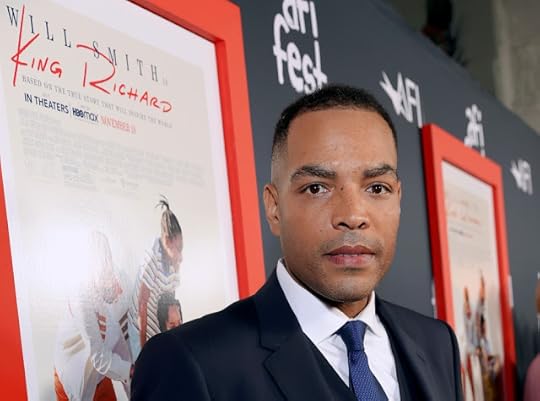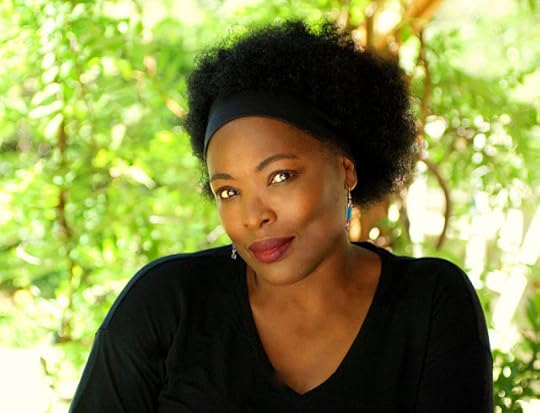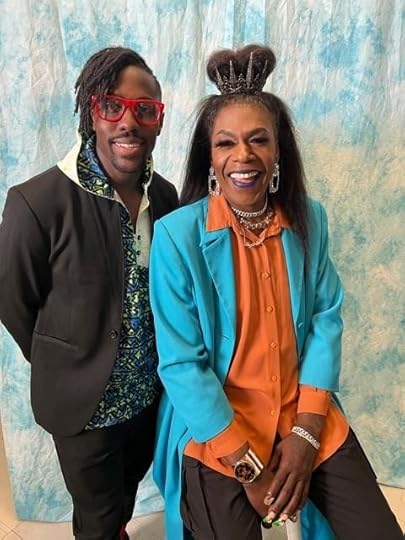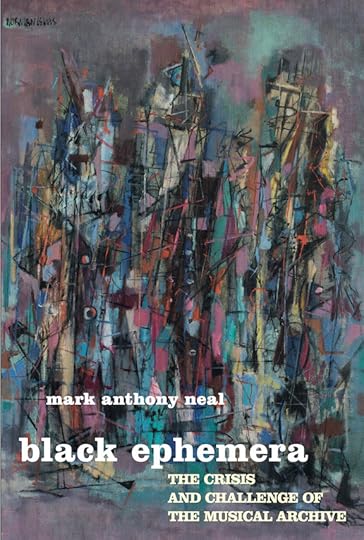Mark Anthony Neal's Blog, page 105
February 26, 2022
Reinaldo Marcus Green on Making KING RICHARD | AFI

'During a seminar at theAmerican Film Institute Conservatory, director Reinaldo Marcus Green discusses his AFI AWARDS-honored film King Richard with AFI Fellows.'
WRITING HOME | American Voices from the Caribbean: “what remains” | episode 07 with Katia D. Ulysse

“No matter how long I’ve been away from home, Haiti remains inside of me.” – Katia D. Ulysse
'For the final episode of WRITING HOME’s second season, Tami Navarro and Kaiama Glover welcome the critically acclaimed Haitian-American fiction and children’s book author Katia D. Ulysse. Reflecting Katia’s stories, this conversation weaves together the vitality of music, the multifaceted bonds between mothers and daughters, and the changing, transnational narratives of Haiti. Katia drops some wonderful gems as she lifts up the names of the people she loves, such as how she learnt how to story-tell at her grandmother’s feet and why she thinks of motherhood as “babysitting her daughter for the ancestors”.'
Power of POP: What TV Gets Wrong About Getting By

'The Opportunity Agenda analyzed 105 episodes to understand what storylines dominate portrayals of income disparities in American TV shows (no spoilers). “What TV Gets Wrong About Getting By,” is the latest research in our Power of POP series and provides tips for both content creators and advocates for how to counter prevailing narratives in television and online. We can write better scripts and better laws to build support and energy towards creating greater economic opportunity and equity in the United States.'
February 25, 2022
Ketanji Brown Jackson Is the Supreme Court Justice We Need Now by Ben Jealous

Ketanji Brown Jackson Is the Supreme Court Justice We Need Now
by Ben Jealous | @BenJealous | special to NewBlackMan (in Exile)
It is with profound joy that I write these words today: Judge Ketanji Brown Jackson has been nominated to become our nation’s first Black woman Supreme Court Justice. From a pool of outstanding Black women attorneys, jurists and legal scholars, President Biden has chosen Judge Jackson for her stellar credentials and brilliant legal mind. We are overjoyed by this nomination; now the Senate needs to move quickly to confirm her.
In the coming weeks we will all get the opportunity to learn more about Judge Jackson’s story and her record. Her legal credentials are outstanding: a double-Harvard alumna, earning both her undergraduate and law degrees with honors; a clerk for three federal judges – including the one she will succeed, Supreme Court Justice Stephen Breyer, who called her “great” and “brilliant”; a star in private practice and as a public defender in Washington, D.C.
The country will also come to know that Judge Jackson wrote nearly 600 opinions in her time as a judge on the U.S. District Court for the District of Columbia, before she was elevated to the Circuit Court – and that she was reversed fewer than twelve times.
But what is just as important as Judge Jackson’s resume is her character, and her deep personal commitment to civil rights. Ketanji Brown Jackson could easily have chosen a lucrative career in private practice, advancing the interests of the wealthy and powerful. Instead, she chose public service. And that speaks volumes.
As a public defender, Judge Jackson represented people who could not afford to hire a lawyer. She chose to stand beside these people in their hour of need, and she has seen the justice system through the eyes of the vulnerable. It’s hard to overstate the importance of that insight in the context of the Supreme Court.
As Vice Chair and Commissioner on the U.S. Sentencing Commission, she worked to end the huge discrepancy between sentences for crack cocaine and powder cocaine, a discrepancy that had a devastating impact on Black communities.
And on the bench, her opinions have shown her dedication to upholding legal protections for people with disabilities, workers, immigrants, freedom of speech, and the environment. Also evident is her commitment to see the humanity of all people who appear in her courtroom.
In one notable instance, Judge Jackson heard the case of a deaf man who was incarcerated and denied even basic accommodations for his disability. Without an ASL interpreter, he could not understand directions. Another prisoner attacked him and he was put in “protective custody” that turned out to be solitary confinement -- a decision he was unable to understand.
Judge Jackson ruled that the correctional facility had broken the law. Not only that, she wrote pointedly and movingly about the significance of laws that protect the rights of people with disabilities. As she put it, “an entity that provides services to the public cannot stand idly by while people with disabilities attempt to utilize programs and services designed for the able-bodied.” That is a moral truth.
And of course, Judge Jackson’s own lived experience as a Black woman enriches her perspective about so many aspects of day-to-day life in the United States. This is a perspective that has never, ever existed on the Court, in all its 233 years.
This perspective is urgently needed now for many reasons, not least of which is because we have reached a point in our history when racial equity and civil rights are facing more attacks than they have in decades. Just as Justice Thurgood Marshall was a justice for his time, joining the Supreme Court at the height of the civil rights movement in the 1960s, Judge Jackson is needed now. There could be no better time for the voice of a brilliant and insightful Black woman on the Court, holding the line for truth and accountability.
That woman is future Supreme Court Justice, Ketanji Brown Jackson. It’s time.
***
BenJealous serves as president of People For the American Way and Professor of the Practice in the Africana Studies Department at the University of Pennsylvania where he teaches leadership. Jealous has decades of experience as a leader, coalition builder, campaigner for social justice and seasoned nonprofit executive. In 2008, he was chosen as the youngest-ever president and CEO of the NAACP. He is a graduate of Columbia University and Oxford, where he was a Rhodes Scholar, and he has taught at Princeton and the University of Pennsylvania.
@font-face {font-family:Helvetica; panose-1:0 0 0 0 0 0 0 0 0 0; mso-font-charset:0; mso-generic-font-family:auto; mso-font-pitch:variable; mso-font-signature:-536870145 1342208091 0 0 415 0;}@font-face {font-family:"Cambria Math"; panose-1:2 4 5 3 5 4 6 3 2 4; mso-font-charset:0; mso-generic-font-family:roman; mso-font-pitch:variable; mso-font-signature:3 0 0 0 1 0;}@font-face {font-family:Calibri; panose-1:2 15 5 2 2 2 4 3 2 4; mso-font-charset:0; mso-generic-font-family:swiss; mso-font-pitch:variable; mso-font-signature:-536859905 -1073732485 9 0 511 0;}p.MsoNormal, li.MsoNormal, div.MsoNormal {mso-style-unhide:no; mso-style-qformat:yes; mso-style-parent:""; margin:0in; mso-pagination:widow-orphan; font-size:12.0pt; font-family:"Calibri",sans-serif; mso-ascii-font-family:Calibri; mso-ascii-theme-font:minor-latin; mso-fareast-font-family:Calibri; mso-fareast-theme-font:minor-latin; mso-hansi-font-family:Calibri; mso-hansi-theme-font:minor-latin; mso-bidi-font-family:"Times New Roman"; mso-bidi-theme-font:minor-bidi;}.MsoChpDefault {mso-style-type:export-only; mso-default-props:yes; font-family:"Calibri",sans-serif; mso-ascii-font-family:Calibri; mso-ascii-theme-font:minor-latin; mso-fareast-font-family:Calibri; mso-fareast-theme-font:minor-latin; mso-hansi-font-family:Calibri; mso-hansi-theme-font:minor-latin; mso-bidi-font-family:"Times New Roman"; mso-bidi-theme-font:minor-bidi;}div.WordSection1 {page:WordSection1;}
February 24, 2022
At the Rothko Chapel, Tyshawn Sorey Explores Sound — and Silence

'Invited to write a new work for Houston's Rothko Chapel, the composer and multi-instrumentalist Tyshawn Sorey created a work that is both intimate and vast, like those Mark Rothko paintings.'
The Rise and Fall of 'America's Dad'

'At the height of his career, Bill Cosby was one of the most famous men in the United States. He was the biggest and highest paid star in the country, and with his image plastered on billboards, advertisements and television, many people felt like they knew him. Of course, few people really knew Bill Cosby. And many of the people who had seen who he was up close would be traumatized for the rest of their lives.'
February 23, 2022
Has Policing Changed Since George Floyd’s Murder?

'So how much has policing actually changed since Floyd’s death? Are we seeing any real oversight? And what are the challenges of making lasting change in policing? For that and more, The Takeaway spoke to Tracey Meares, professor at Yale Law School and a founding director of the Justice Collaboratory, and Nia T. Evans, writer, researcher, and fellow at the Boston Review.'
The Story of The Last Slave Ship in the U.S with its Discoverer Ben Raines

'The Clotilda was the last known ship to carry enslaved people from Africa to the United States, landing near Mobile, Alabama, in 1860. For decades, the location of its remains were a mystery, until 2019, when they were discovered by journalist Ben Raines. Raines joins All Of It to discuss his book, The Last Slave Ship: The True Story of How Clotilda Was Found, Her Descendants, and an Extraordinary Reckoning.'
Big Freedia and Jonathan Lykes on Bringing Joy and Movement to Activism

'For the next piece of The Takeaway's ongoing series Black.Queer.Rising, we're shaking things up with the Queen of Bounce, Big Freedia, who joined the show to talk about how activism, identity, and movement come together in her work. Also joining for the conversation is artist and activist Jonathan Lykes who recently collaborated with Freedia on the song “Ella Baker Shaker,” for his compilation album The Black Joy Experience volume 2: Comrade.'
“I Got the Blues of a Fallen Teardrop”: An Original #BlackEphemera Mix by Lynnée Denise

“I Got the Blues of a Fallen Teardrop”: An Original #BlackEphemera Mix by Lynnée Denise
Soul Expressions 2.0 · “I Got the Blues of a Fallen Teardrop”: An Original #BlackEphemera Mix by Lynnée Denise“What is there to be heard in the music, lyrics, and voices of early Black blues women singers like Clara Smith, Victoria Spivey, Sippie Wallace, and Edith Wilson, and how does the archive of their work animate and inform the life of a late twentieth-century-character who is navigating much of the same terrain?”
–- Mark Anthony Neal, Black Ephemera: The Crisis and the Challenge of the Musical Archive | Chapter Two: “I Got the Blues of a Fallen Teardrop”: Erasure, Trauma, and a Sonic Archive of Black Women (NYU Press)
Lynnée Denise is an artist, scholar, writer, and DJ whose work reflects on underground cultural movements, the 1980s, migration studies, theories of escape, and electronic music of the African Diaspora. Denise coined the phrase “DJ Scholarship” to re-position the role of the DJ from a party purveyor to an archivist, cultural custodian, and information specialist of music with critical value. Through interactive workshops, lectures, and presentations at universities, conferences, and performance venues, Denise harnesses music as a medium for vital public dialogue on how to transform the way that music of the Black Atlantic is understood in its social context and beyond entertainment. Lynnée Denise is the Sterling Brown '22 Visiting Professor of Africana Studies at Williams College and lives and works in London.
Mark Anthony Neal's Blog
- Mark Anthony Neal's profile
- 30 followers



